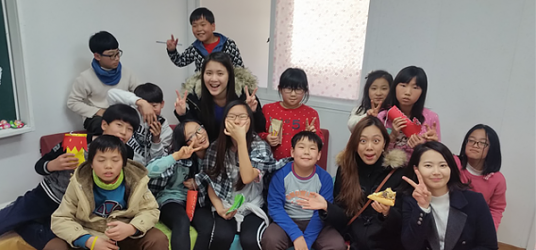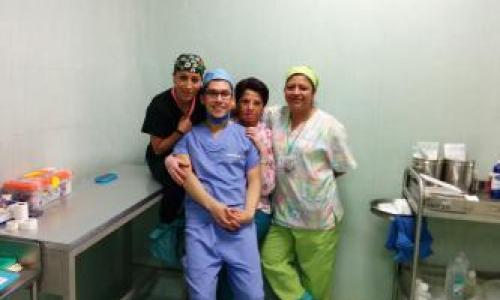
If someone had told me several months ago that I would be working abroad in Korea, I would have thought they were crazy. For the majority of my life, I have been sheltered, living under my parent’s roof with little independence. I was content with these circumstances because I was comfortable. However, being comfortable is not always enough. I needed something beyond comfort.
While taking Health Sciences related courses at Simon Fraser University, I was intrigued by the idea of working abroad in a developing country and promoting health interventions. In particular, improving equity in health was my objective when considering my career goals after post secondary. When I began searching through Health Sciences Co-op positions, few were based outside of British Columbia, let alone outside of Canada. Beginning the job seeking process, I had a difficult time applying to jobs because I felt too under qualified. With the little work experience I had, no matter how great of a resume and cover letter I thought I could produce, it seemed to pale in comparison to other students who had a wide array of skills and experiences. Nearing the end of my job seeking process, my friend recommended a Communication Co-op posting for TaLK. TaLK stands for Teach and Learn in Korea, a unique educational scholarship open to university students in their third year or higher, with no background in the field of education needed. TaLK Scholars are required to teach English in elementary schools in rural areas of South Korea for 15 hours a week on a six-month contract. This interested me right away because it was an opportunity to gain work experience abroad, as well as to explore South Korea. After a two-month-long interview process, I was accepted as a TaLK scholar in the city of Jeonju, Jeollabuk-do, along with ten fellow SFU students. Before coming to Korea, my co-op advisor in charge of TaLK advised us all to learn as much Korean as possible. One can get by with speaking English while in South Korea, but, as we were advised, having some basic knowledge of the language will make life a lot more convenient. Despite these suggestions, I did not study Korean prior to my work-term, which I believe made it more difficult to transition to an environment where very few actually spoke English. I advise anyone who is considering working abroad in a foreign country to learn the language as much as possible. Consequently, it can make your experience in the country a lot more meaningful by being able to interact with the locals.
I first arrived in Busan, the city where our initial two-week national orientation was to take place and had the opportunity to meet people from all over the world. These first two weeks of my Korean experience held some of the most memorable experiences for me, from sitting through six to eight hour workshops, to wearing traditional Korean dresses (hanboks) for the first time, and even becoming enlightened about the bitter rivalry amongst New Zealanders and Australians. Afterwards, we were separated into our different provinces for an additional week to prep us before we were sent to our respective schools. As the week went by, I learned and studied teaching theory and practice, but as I would soon discover, what you learn in the classroom can be completely different when put into practice in the workplace.
In the last week of August, I moved into my apartment in the heart of Jeonju; conveniently close to four other SFU co-op students. My school was tucked in the mountains of Jeongeup, a two-hour bus ride from my house. The day after I moved into my apartment, I taught for the first time. One of the biggest and most unexpected learning experiences in teaching was how much I underestimated the children’s energy and communication skills, especially with a language barrier. I quickly realized that treating them like small adults was not a good approach, as some did not have the English language skills to converse, or negotiate with me in the classroom. After my first week of teaching, I also realized that not many of the children had any motivation to learn English as a foreign language. With help from other TaLK scholars, I created a daily five points system where the class with the most points at the end of the semester would have a Christmas party. This system tremendously improved classroom management and gave the children an incentive to study English. In addition to this, I came to learn that teaching is not without its drawbacks. After becoming a TaLK Scholar, I gained a profound respect for teachers, who have a lot of work cut out for them outside of the classroom. There is a lot of preparation and lesson planning on which I spent anywhere from one to two hours every day. Furthermore, being an after school teacher means independently creating lesson modules on my own, and having little guidance given by the school. Nonetheless, seeing the progress of my students who once lacked confidence in speaking English be able to express themselves gave me pride in my teaching abilities.
From my experience in this co-op term, I have learned a lot about myself and my future job goals. In particular, I was fortunate enough to have had the opportunity to move beyond my comfort zone and immerse myself in a foreign culture, as well as to interact with people from different backgrounds and cultures from all over the world. For my future career goals, I hope to work in the health sector in a role that deals with children after discovering my passion working with Korean school children. I am grateful for the opportunity to have taught in South Korea, not only because I was able to help encourage and strengthen the children's English language abilities, but also to have had learning experiences I can bring with me back to Canada.
The TaLK Program was cancelled in 2021 because of unforeseen complications from the pandemic. Students interested in teaching in Korea may want to consider the EPIK Program.
Beyond the Blog
-
Learn more about TaLK by visiting their website.















